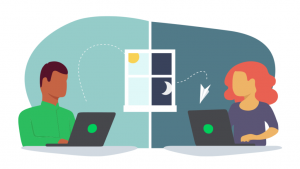 This is a stressful time. As we continue to live with uncertainty, nerves can fray, hope can turn to fear, and disappointment can turn to deep sadness and depression. As the weeks of our pandemic quarantine pass, our initial response of being on our best behavior may be giving way to more normal reactions to work annoyances and unrealistic expectations.
This is a stressful time. As we continue to live with uncertainty, nerves can fray, hope can turn to fear, and disappointment can turn to deep sadness and depression. As the weeks of our pandemic quarantine pass, our initial response of being on our best behavior may be giving way to more normal reactions to work annoyances and unrealistic expectations.
So, without sounding sappy – and those who know me know I’m not sappy – what if we all tried to be nicer to one another? I’m talking about kindness and respect. There may be certain days where remembering to be nice to your co-workers, clients, vendors or management could pose a challenge, but you can forgive yourself for those days and start again tomorrow.
What takes a few seconds to do could make someone’s day. You have no idea what people are dealing with in their personal lives so just be nice, it’s that simple.
Consider the following:
- How about asking everyone you come in contact with – “How is your day going?” And wait for their answer. Let’s go a little deeper than the usual, exchange of “How are you?” “Fine.”
- When on a Zoom call, why not say, “You look good today.” Then wait to see the other person smile.
- Reach out to people via text, phone or email and say – “I was thinking about you” especially to those co-workers who live alone.
- Take a moment to tell your coworkers, “Nice job on that project.” Of course, you do need to mean it. Acknowledging the effort someone puts into their work can help them feel good – especially during these difficult days.
- Practice saying, “Thank you,” even for the small things. Most of the time, we don’t need to thank others daily. We’re usually working at a fast pace, moving from one thing to the next. Offering an unexpected “Thank you,” can create a much-needed positive moment in someone’s day.
- When in a virtual or in-person meeting try saying, “I appreciate your input.” So often we don’t take the time to acknowledge the ideas that other people contribute. Whether we use that input or not, praising another person for their ideas helps them flourish and get better at offering ideas over time.
I know that not all corporate cultures will find these practices comfortable, so pick and choose wisely. But kindness and praise never hurt anyone, so give it a try.
Kathi Elster – Executive Coach and co-owner of K Squared Enterprises.
Contact us at info@mycrazyoffice.co for any further help around this topic.

 As many of us move through week nine of sheltering in place, it becomes more and more difficult to simply “keep calm and carry on.”
As many of us move through week nine of sheltering in place, it becomes more and more difficult to simply “keep calm and carry on.” If you are one of the lucky ones to have a good job it is your responsibility to make your work stand out to ensure that you are not on the short list if there are any future layoffs.
If you are one of the lucky ones to have a good job it is your responsibility to make your work stand out to ensure that you are not on the short list if there are any future layoffs. As our world, our country, our states, our towns, and our communities work hard to address the many aspects of the COVID-19 pandemic, each of us has another internal challenge that requires our constant attention – How do we manage living with so much uncertainty?
As our world, our country, our states, our towns, and our communities work hard to address the many aspects of the COVID-19 pandemic, each of us has another internal challenge that requires our constant attention – How do we manage living with so much uncertainty? In the post COVID world, a return to the way things were in our traditional workplace is most likely not possible. The new standards of how we work at an office are being set for at least the next one to two years, or is it forever?
In the post COVID world, a return to the way things were in our traditional workplace is most likely not possible. The new standards of how we work at an office are being set for at least the next one to two years, or is it forever? So here we are. For many people this is week six (or more) of sheltering in place.
So here we are. For many people this is week six (or more) of sheltering in place. During this pandemic, it’s our essential workers who can travel and physically go to work while the rest of us shelter at home.
During this pandemic, it’s our essential workers who can travel and physically go to work while the rest of us shelter at home. As many of us move through another week of being Sheltered in Place, it becomes increasingly more challenging to break away from the continuous demands of home, work, family, child care, elder care, animal care, and take a moment for ourselves. Without any boundaries or breaks between home life and work life, hard workers just work harder, depleting their energy to the point of either freaking out, blowing up or collapsing from exhaustion. You may find yourself feeling depressed, unfocused, or less productive than usual. For any and all of these circumstances, self-care can help.
As many of us move through another week of being Sheltered in Place, it becomes increasingly more challenging to break away from the continuous demands of home, work, family, child care, elder care, animal care, and take a moment for ourselves. Without any boundaries or breaks between home life and work life, hard workers just work harder, depleting their energy to the point of either freaking out, blowing up or collapsing from exhaustion. You may find yourself feeling depressed, unfocused, or less productive than usual. For any and all of these circumstances, self-care can help.

Looking to advertise with us?
We have sponsorships available on the My Crazy Office Podcast.
Please email us at info@mycrazyoffice.co.